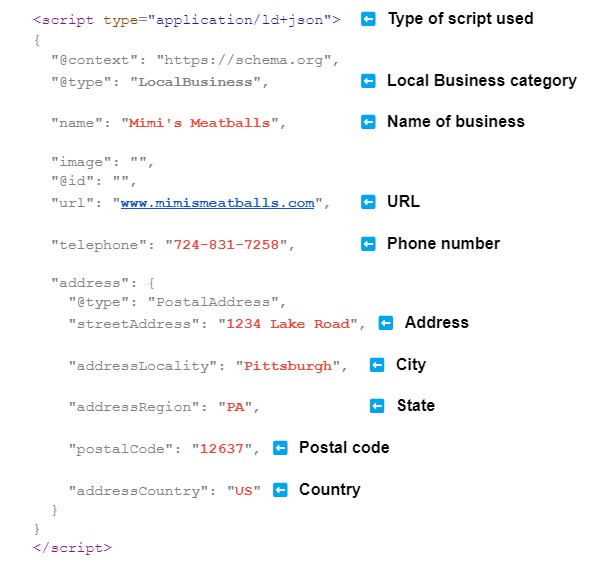In today's digital world, establishing a strong online presence is crucial. One of the most efficient ways to accomplish this is by strategically improving your ranking on search engines.
Schema markup, also known as structured data, is a powerful tool that allows search engines to both recognize and understand your site’s content. In understanding its benefits, you can learn how to use schema markup for Search Engine Optimization (SEO) — and improve your online success.
What is Schema Markup?
Simply put, schema markup is a coded language that search engines use to comprehend and categorize web content.
And while search engines are incredibly powerful, they lack the visual insight we possess. They can't "see" images and text like we do; instead, they rely on the structured data within your code to understand the content. Essentially, schema markup allows search engines to assign meaning to the components of a webpage and to display them in search results accordingly.
What Does Schema Markup Look Like?
Note that there are several formats for structured data, but one of the most common is known as JSON-LD (JavaScript Object Notation-Linked Data). JSON-LD utilizes a straightforward system of attribute-value pairs, which can be very easily understood by Google’s search algorithm. For example:

In this instance, “name” is the given attribute, and “Mimi’s Meatballs” is the related value. The more of these pairs you include in your code, the better you convey your webpage’s identity and overall purpose to Google.
Or, let’s say you wanted to create a schema for your local business:

Using a schema generator, you can input numerous attributes and values, all of which will provide customers with important information regarding your business.
How to Use Schema Markup for SEO
Before you can understand how to use schema markup, you must first understand its impact on search engines.
Schema markup makes it easier for search engines to understand the content of your page. When search engines grasp your content better, they can match it with user queries more accurately, increasing the likelihood of your website appearing in relevant search results.
Another notable benefit of schema markup is the potential to achieve rich results in Search Engine Results Pages (or SERPs). Rich results are enhanced search listings that provide users with more information about a business right on the search results page. This could include star ratings, product prices, event dates, and more (depending on the type of schema used).
Where to Add Schema Markup
All major search engines, including Google, Microsoft, and others, have adopted a common data language for markup. Simply go to schema.org and fill out the required field. You will also find additional information and examples to help you generate the correct schema for your business.
The next step is the insert the generated markup in either the head or body of your web page’s source code. This can be easily done through a website’s content management system (CMS). Certain CMS models may include dedicated fields for adding your structured data, which makes the process more accessible to non-technical users.
Types of Schema Markup
Schemas are divided into various categories, and you can use multiple schemas on a single page. The more relevant schemas you use, the better search engines can understand your content.
Common schema types include but are not limited to:
- Event
- Organization
- FAQ
- Product or special offer
- Person
- Local Business
- Review
- Article
- Video
- Recipe
Rich Results Vs. Featured Snippets
Rich results and featured snippets can often be confused with one another, but it is important to know the difference when learning how to use schema markup.
Rich results depend on the schema you use and how users are searching for a given topic. For example, a user searching for questions might trigger a FAQ-style rich result, while a food search could lead to a recipe rich result. In this case, schema markup is essential for generating quality rich results.
Featured snippets, on the other hand, differ in their display and often show up as answers to specific queries. They don't necessarily require schema markup, but they can be influenced by various factors such as the quality of your content. Rather than a schema telling Google what to present to users, the search engine pulls a section of text from your content that will best answer the user’s query. Examples include a paragraph from a featured article, a dictionary definition, or a table presenting related information.
How to Choose & Verify Schema Markup
You’ll want to begin by researching what Google generates when you search for keywords related to your industry. This will give you insight into the type of rich results that are commonly displayed.
Next, analyze what your competitors are using in terms of schema markup. Are there opportunities they've missed that you could implement? Can you stand out with a unique schema type? Make sure that you always validate your schema markup using the markup validation tool found at schema.org. This will ensure that your schema adheres to the specified guidelines.
You have the option to also run your markup through Google’s rich results tool. This feature can help you when assessing which types of rich results can be generated from your structured data.
Why Schema Matters
So, why does schema make such a large difference in your online web presence? For starters, schema markup provides more information about your content than traditional metadata alone. This additional context can lead to rich results that drastically improve your click-through rate from search results.
With the limited space available on search results pages, securing a spot in rich results can significantly enhance your website's visibility (particularly when mobile devices are in use). Similarly, any rich results produced from schema markup will make for a better user experience (UX), which improves consumer satisfaction as well as brand retention.
Boost Your Web Presence with Epic Web!
Ready to take your web presence to the next level? Contact us today and discover how our expert team can help you rise to the top!



